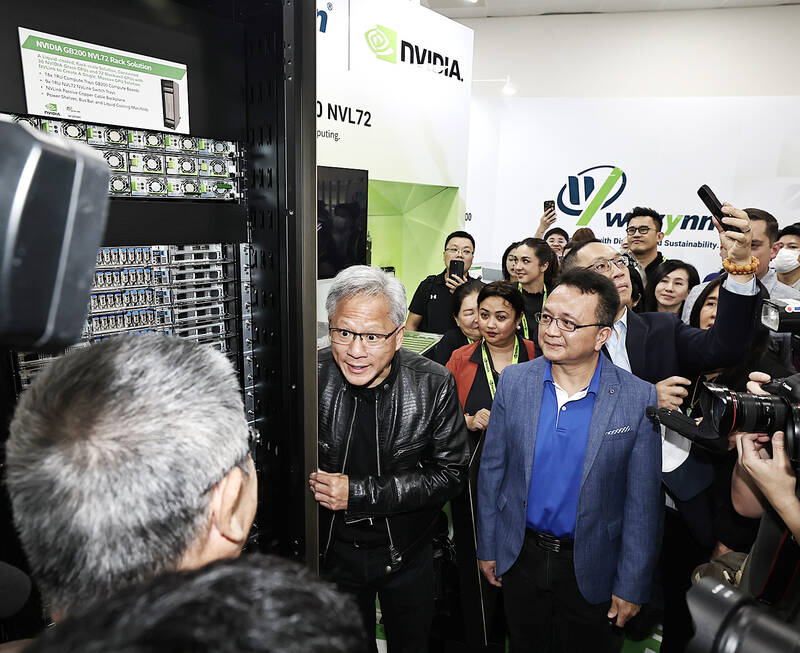Wiwynn Corp (緯穎), a developer and manufacturer of artificial intelligence (AI) servers, yesterday posted annual growth of 79.5 percent in net profit for last quarter as customers showed a strong appetite for cloud-based computing devices.
Net profit jumped to NT$4.69 billion (US$143.9 million) last quarter, compared with NT$2.62 billion in the second quarter of last year. However, on a quarterly basis, it represented a decline of 0.3 percent from NT$4.71 billion, which was an all-time high.
Gross margin improved to 10.8 percent last quarter from 8.8 percent a year earlier, but fell from 11.1 percent in the first quarter.

Photo: CNA
Wiwynn said it holds an upbeat view about cloud devices and AI-based server market demand in the long term.
To cope with business growth, the company’s board of directors yesterday approved a proposal to inject US$500 million into its US subsidiary, Wiwynn International Corp, with an aim to boost operational capital and optimize its financial structure.
The company in June said that AI servers accounted for about 20 percent of its total revenue in the first quarter and it expected rapidly growing demand would help boost the revenue contribution of AI servers to about 50 percent in the fourth quarter of this year.
At the time, Wiwynn said part of its revenue might come from servers outfitted with Nvidia Corp’s new Blackwell graphic processing units.
The company’s revenue soared 76.23 percent year-on-year to NT$31.12 billion last month, compared with NT$17.66 billion a year earlier, a company filing with the Taiwan Stock Exchange said yesterday.
Compared with NT$30.76 billion in June, revenue edged up 1.17 percent last month.
During the first seven months of the year, revenue expanded 20.27 percent year-on-year to NT$178.23 billion from NT$148.29 billion.
The AI boom is not only giving a boost to AI server makers such as Wiwynn, but also prompted chip tester King Yuan Electronics Co (京元電子) to significantly raise its capital spending in response to strong demand for testing services for AI and high-performance computing chips.
King Yuan, which provides chip testing services for Nvidia, yesterday said it plans to increase its capital expenditure to a record NT$13.83 billion for this year, from its previous estimate of NT$5.31 billion.
The company yesterday posted NT$3.27 billion in net profit for the first half of this year, up 19.78 percent from NT$2.73 billion in the same period last year.
Gross margin improved to 34.18 percent during the first half from 32.89 percent a year earlier.

Hon Hai Precision Industry Co (鴻海精密) yesterday said that its research institute has launched its first advanced artificial intelligence (AI) large language model (LLM) using traditional Chinese, with technology assistance from Nvidia Corp. Hon Hai, also known as Foxconn Technology Group (富士康科技集團), said the LLM, FoxBrain, is expected to improve its data analysis capabilities for smart manufacturing, and electric vehicle and smart city development. An LLM is a type of AI trained on vast amounts of text data and uses deep learning techniques, particularly neural networks, to process and generate language. They are essential for building and improving AI-powered servers. Nvidia provided assistance

GREAT SUCCESS: Republican Senator Todd Young expressed surprise at Trump’s comments and said he expects the administration to keep the program running US lawmakers who helped secure billions of dollars in subsidies for domestic semiconductor manufacturing rejected US President Donald Trump’s call to revoke the 2022 CHIPS and Science Act, signaling that any repeal effort in the US Congress would fall short. US Senate Minority Leader Chuck Schumer, who negotiated the law, on Wednesday said that Trump’s demand would fail, while a top Republican proponent, US Senator Todd Young, expressed surprise at the president’s comments and said he expects the administration to keep the program running. The CHIPS Act is “essential for America leading the world in tech, leading the world in AI [artificial

DOMESTIC SUPPLY: The probe comes as Donald Trump has called for the repeal of the US$52.7 billion CHIPS and Science Act, which the US Congress passed in 2022 The Office of the US Trade Representative is to hold a hearing tomorrow into older Chinese-made “legacy” semiconductors that could heap more US tariffs on chips from China that power everyday goods from cars to washing machines to telecoms equipment. The probe, which began during former US president Joe Biden’s tenure in December last year, aims to protect US and other semiconductor producers from China’s massive state-driven buildup of domestic chip supply. A 50 percent US tariff on Chinese semiconductors began on Jan. 1. Legacy chips use older manufacturing processes introduced more than a decade ago and are often far simpler than

Gasoline and diesel prices this week are to decrease NT$0.5 and NT$1 per liter respectively as international crude prices continued to fall last week, CPC Corp, Taiwan (CPC, 台灣中油) and Formosa Petrochemical Corp (台塑石化) said yesterday. Effective today, gasoline prices at CPC and Formosa stations are to decrease to NT$29.2, NT$30.7 and NT$32.7 per liter for 92, 95 and 98-octane unleaded gasoline respectively, while premium diesel is to cost NT$27.9 per liter at CPC stations and NT$27.7 at Formosa pumps, the companies said in separate statements. Global crude oil prices dropped last week after the eight OPEC+ members said they would